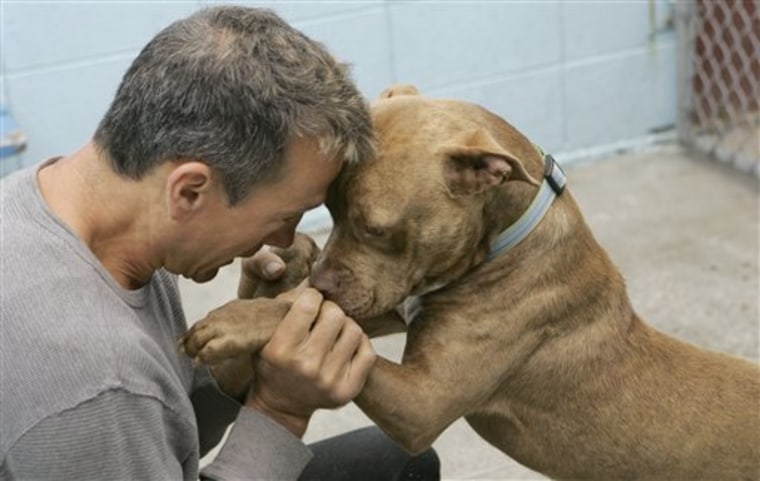As teams begin evaluating hundreds of pit bulls seized in the largest U.S. raid on dogfighters, the Humane Society of Missouri has issued an urgent call to rescue groups to help find homes for the dogs deemed eligible for adoption.
On Friday, teams of animal behavior experts from across the nation are set to begin assessing more than 400 dogs seized from alleged dogfighting operations in Missouri and Illinois earlier this month. About 100 more pit bulls taken from operations in Iowa, Texas, Oklahoma, Mississippi and Nebraska also will have to be evaluated.
So far, the humane society has heard from just over a dozen rescue groups willing to find homes for one or two dogs, but said more are needed. Animal groups say they haven't had a crisis response of this magnitude since thousands of pets were dislocated in Hurricane Katrina.
"We're going to need a whole lot of new friends to help the animals in this case," said Debbie Hill, the Humane Society of Missouri's vice president. "There are so many more in this unprecedented raid."
Shelters already overcrowded
The pit bulls' seizure comes as U.S. shelters are inundated with abandoned dogs and cats, 3.7 million of which are euthanized each year because they can't find homes.
The teams will analyze the dogs' demeanor and spirit — are they aggressive, traumatized, shy or confident? Can they be socialized and trained, or are they too broken to repair? The Humane Society of Missouri will report the findings to the federal courts, which have the final say. Until then, the Missouri and Illinois dogs are being sheltered in St. Louis.
Few U.S. rescue groups are educated, committed and resourceful enough to take more than a handful of dogs, said Hill, who wants the best possible rescue groups, not the hobbyist who likes the pit bull breed, or a group inexperienced with fighting dogs.
Missouri Pit Bull Rescue said it probably will take a few dogs, as it did from a southeast Missouri dogfight bust two years ago, president Veronique Chesser said. But the choice means balancing the dogs against its other commitments. The group, which runs on private donations and big-hearted foster families passionate about the breed, also picks dogs to rescue from the Kansas City Animal Shelter, which euthanizes a dozen pit bulls each day.
So, whatever it accepts from St. Louis "means two to four dogs that will be killed here," Chesser said, referring to Kansas City.
Missouri's Humane Society already got a test of what it might take to place the dogs after 10 more pit bulls were surrendered to HSMO investigators working a phone tip the day after the July 8 nationwide raids. The dogs ended up in California four days later, courtesy of Bay Area Doglovers Responsible About Pit Bulls, or Bad Rap, which helped evaluate the dogs taken from NFL star Michael Vick's dogfighting operation.
Bad Rap's Donna Reynolds got commitments for temporary shelter space and foster homes within hours of a frantic flurry of e-mails and calls to Bay Area shelters and rescue groups. Then, Bad Rap evaluated them.
'Sponges for human affection'
About half were found to be shoe-ins for adoption, such as Jett, a social, dog- and cat-friendly but scarred male. Another candidate, Beauty, was small, muscular and scarred, maybe pregnant. Her ears are cropped short, and she has a bulging, possibly blind eye from an old injury that will get medical attention.
"They were sponges for human affection," Berkeley Animal Care Services volunteer Emily Colwell said.
One is still being evaluated, and four who were not as well socialized will be euthanized after a few days or weeks in a "compassion hold" in a foster home.
Humane teams aren't venturing any guesses about how many of the bust dogs will show themselves capable of being a pet. And they can't say how many may have to be put down. For now, they're focusing on giving each dog a chance and helping as many as possible end up in good homes.
"We don't freak out when we don't have all the answers yet," Hill said. "We're very thoughtful and methodical. We keep going down the path."
